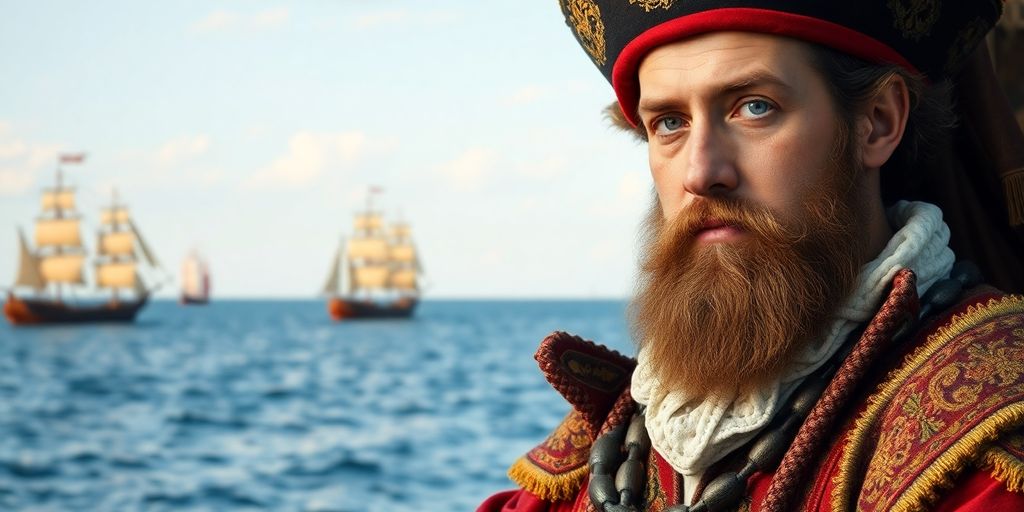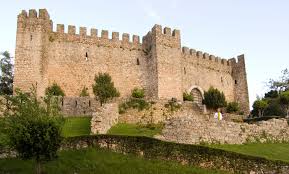Henry the Navigator, a Portuguese prince from the 15th century, is often remembered for his role in the early days of the Age of Discovery. Although he wasn’t a sailor himself, he played a crucial part in advancing maritime exploration. By gathering a team of experts and sponsoring expeditions, Henry helped set the stage for Portugal’s global empire. His efforts not only expanded geographical knowledge but also laid the groundwork for European colonization, with both positive and negative consequences.
Early Life and Background of Henry the Navigator
Birth and Family Lineage
Henry the Navigator was born on March 4, 1394, in Porto, Portugal. He was the third surviving son of King John I of Portugal and Queen Philippa of Lancaster, an English noblewoman. This royal lineage placed Henry in a unique position to influence Portuguese politics and exploration. His family ties not only connected him to the Portuguese throne but also linked him to the powerful English monarchy, thanks to his mother’s heritage. This connection played a significant role in shaping his outlook and ambitions.
Influence of the Reconquista
The Reconquista, a series of campaigns by Christian states to recapture territory from the Muslims, significantly impacted Henry’s early life. Growing up during this period of religious and territorial conflict, Henry developed a strong sense of Christian duty and a desire to expand his faith. This influence is evident in his later endeavors, as he sought to spread Christianity to new lands and challenge Muslim influence, particularly in North Africa.
Education and Early Interests
Henry received a comprehensive education that included subjects like navigation, astronomy, and mathematics. These areas of study were crucial for his later achievements in maritime exploration. Although he was not a sailor himself, his education allowed him to understand and support the development of navigational techniques. His keen interest in the sciences and exploration laid the groundwork for his future role in advancing Portuguese maritime ventures.
Henry’s early life was marked by a blend of royal privilege, religious fervor, and intellectual curiosity, setting the stage for his pivotal role in the Age of Discovery.
The Role of Henry the Navigator in Maritime Exploration

Establishment of the School of Navigation
Henry the Navigator, despite the myths, did not establish a formal school of navigation at Sagres. However, he was instrumental in gathering a team of skilled maritime experts, cartographers, and shipbuilders. This group worked on improving navigational techniques and designing ships that could withstand longer voyages. The caravel, a nimble and sturdy ship, emerged from these efforts, proving crucial for the exploratory missions along the West African coast.
Innovations in Ship Design and Navigation
The caravels, with their lateen sails, were a game-changer. These ships could sail against the wind, allowing explorers to venture further than ever before. Henry’s interest in navigation led to advancements in the use of the astrolabe and compass, making it easier for sailors to determine their position at sea. This period marked a shift from coastal hugging to open sea exploration, paving the way for future discoveries.
Key Expeditions Sponsored by Henry
Henry sponsored numerous expeditions that expanded Portuguese knowledge and influence. These voyages, often departing from the port of Lagos, ventured along the African coast. Notable expeditions include those led by explorers like Alvise Cadamosto, who discovered parts of the Cape Verde Islands. These missions not only mapped uncharted territories but also opened new trade routes, setting the stage for the Age of Discovery.
Henry the Navigator’s ambition was not just about exploration but also about expanding Portugal’s reach and wealth. His sponsorship of expeditions was driven by a mix of curiosity, religious zeal, and economic interest, laying the groundwork for European colonialism and global trade networks.
Henry the Navigator’s Impact on the Age of Discovery

Expansion of Portuguese Influence
Prince Henry the Navigator played a huge role in expanding Portugal’s reach during the Age of Discovery. He sponsored numerous expeditions along the African coast, which not only led to the discovery of new lands but also helped establish Portuguese dominance in maritime exploration. His efforts laid the groundwork for Portugal’s colonial empire, stretching from Africa to Asia and beyond. Under his guidance, Portuguese sailors ventured further than ever before, mapping uncharted territories and establishing trading posts that would become crucial to Portugal’s wealth and power.
Contributions to Global Trade Routes
Henry’s support for exploration significantly altered global trade dynamics. By opening new sea routes, particularly around the west coast of Africa, he enabled the flow of goods like gold, spices, and other valuable commodities between continents. This maritime expansion allowed Portugal to tap into lucrative markets and set the stage for the global trade networks that we know today. The establishment of these routes was pivotal in shifting the economic power from the Mediterranean to the Atlantic, changing the course of history.
Initiation of the Transatlantic Slave Trade
While Henry’s expeditions brought wealth and knowledge, they also initiated one of history’s darkest chapters—the transatlantic slave trade. In their quest for profit and expansion, Portuguese explorers, under Henry’s patronage, began capturing and trading enslaved Africans. This marked the beginning of a brutal and inhumane trade that would last for centuries, causing untold suffering and reshaping societies across continents. It’s a stark reminder that exploration and discovery often came with severe human costs.
Despite his title, Henry the Navigator never sailed on these voyages himself. Instead, he orchestrated and financed them, driven by a desire to expand his nation’s reach and influence. His legacy is a complex mix of groundbreaking exploration and significant ethical controversies.
- Expansion of influence: Portugal became a leading maritime power.
- Trade routes: New paths for commerce were established.
- Slave trade: Initiated a tragic era of human exploitation.
Henry’s impact on exploration is undeniable, but it’s essential to remember the full scope of his actions, both positive and negative. His endeavors not only reshaped the world map but also had profound implications for the people and cultures involved. Prince Henry the Navigator was a pioneer, but his legacy is as much about the consequences of his pursuits as it is about his achievements.
The Legacy and Controversies Surrounding Henry the Navigator
Myth vs. Reality of His Achievements
Henry the Navigator is often celebrated as a visionary who kick-started the Age of Discovery. However, much of his legacy is wrapped in myth. The title “Navigator” wasn’t even used during his lifetime. It was coined centuries later by historians. Despite popular belief, Henry himself rarely embarked on voyages. Instead, he funded and organized expeditions, which laid the groundwork for the Portuguese Empire. The idea of him as a scholarly figure was also a later embellishment. His real contributions were more about financing and planning than personal exploration.
Criticism of His Role in the Slave Trade
Henry’s expeditions were not just about discovery; they also opened the door to the transatlantic slave trade. His efforts to explore the West African coast were partly driven by a desire to find new sources of wealth, including human captives. This aspect of his legacy is often criticized, as it marked the beginning of a dark chapter in global history. Henry’s actions contributed to a system that would exploit countless lives for centuries.
Cultural and Historical Depictions
Over the years, Henry the Navigator has been depicted in various ways, from a revered national hero to a controversial figure. In Lisbon, he is prominently displayed on the Monument of the Discoveries, symbolizing Portugal’s maritime glory. Yet, historical reassessment has painted a more nuanced picture. Some see him as a man who was both a product and a shaper of his times. His life and actions continue to be a subject of debate, reflecting the complex nature of his impact on exploration.
The Death and Commemoration of Henry the Navigator
Circumstances of His Death
Henry the Navigator passed away on November 13, 1460, in Sagres, Portugal. By this time, the Portuguese had already explored as far as present-day Sierra Leone. Henry didn’t live to see the full extent of the Portuguese Empire that he helped set in motion. His death marked the end of an era, but the voyages he sponsored had laid the groundwork for future explorations. His legacy was cemented by the navigational advancements and explorations that continued after his death.
Monuments and Memorials
Henry’s contributions to maritime exploration have been commemorated in various ways. His tomb is located in the Batalha Monastery in central Portugal, a fitting tribute to a man who significantly impacted global exploration. In Lisbon, he is prominently featured in the Monument of the Discoveries, which celebrates Portuguese explorers. Additionally, the Prince Henry Society, along with the Portuguese government, established the Prince Henry the Navigator Park in New Bedford, Massachusetts, in 1994.
Historical Reassessment of His Life
Over the centuries, Henry the Navigator has been both celebrated and criticized. While he is often hailed as a pioneer of the Age of Discovery, his role in initiating the transatlantic slave trade has drawn significant criticism. The slave trade, which began under his patronage, brought immense suffering and has left a dark stain on his legacy. Modern historians continue to reassess his life, balancing his achievements in navigation and exploration with the ethical implications of his actions.
Henry’s story is a complex tapestry of ambition, exploration, and exploitation. His vision opened new worlds, but it also unleashed forces that would have profound consequences for millions. As we remember Henry the Navigator, we grapple with the dual nature of his legacy—one of discovery and one of human cost.
The Influence of Henry the Navigator on Future Explorations
Inspiration for Future Explorers
Henry the Navigator, though not a sailor himself, inspired generations of explorers through his dedication to maritime ventures. His efforts in funding expeditions and fostering a spirit of discovery laid the groundwork for the Age of Exploration. His vision led to the discovery of new lands and sea routes, sparking an era of global exploration. Many explorers who came after him, such as Vasco da Gama and Christopher Columbus, were motivated by the possibilities that Henry’s initiatives unearthed.
Long-term Effects on European Colonization
The expeditions sponsored by Henry the Navigator significantly impacted European colonization efforts. By opening up new territories, he set the stage for the establishment of European colonies in Africa, Asia, and the Americas. This expansion not only increased the wealth and influence of European nations but also led to profound cultural exchanges, albeit often at the expense of indigenous populations. Henry’s endeavors marked the beginning of a new era where European powers sought to dominate global trade and politics.
Technological Advancements in Navigation
Henry’s influence extended beyond exploration into the realm of technological advancements. Under his patronage, innovations in ship design and navigation techniques flourished. The development of the caravel, a nimble and efficient ship, revolutionized sea travel. Additionally, his support for the creation of detailed maps and navigational instruments equipped explorers with the tools they needed to venture into uncharted waters. These advancements not only facilitated the success of his own sponsored voyages but also paved the way for future maritime achievements.
Henry the Navigator’s legacy is a complex tapestry of exploration, innovation, and expansion. While his actions opened the world to new opportunities, they also set the stage for significant cultural and political shifts that continue to resonate today.
Conclusion
So, there you have it. Henry the Navigator wasn’t just some guy with a fancy title. He was a big deal in the world of exploration, even if he didn’t actually sail the seas himself. By backing voyages and gathering smart folks to figure out better ways to travel, he helped kick off the Age of Discovery. Sure, not everything he did was great—like the start of the transatlantic slave trade—but his actions changed the world. Portugal got richer and more powerful, and the map of the world started to look a whole lot different. In the end, Henry’s legacy is a mixed bag, but you can’t deny he left a mark on history.
Frequently Asked Questions
Who was Henry the Navigator?
Henry the Navigator was a Portuguese prince in the 15th century, famous for promoting and funding many exploration voyages along the African coast, which helped start the Age of Discovery.
What did Henry the Navigator do?
Henry the Navigator sponsored numerous expeditions that explored the West African coast, helping to map unknown territories and open new trade routes for Portugal.
Why is Henry called ‘the Navigator’ if he didn’t sail?
Henry earned the nickname ‘the Navigator’ because he organized and funded expeditions and gathered experts to improve navigation techniques, not because he sailed himself.
Did Henry the Navigator start the slave trade?
Henry the Navigator played a role in the early Atlantic slave trade by sponsoring expeditions that captured and brought enslaved Africans to Portugal.
What was the School of Navigation?
The School of Navigation was a center established by Henry the Navigator, where experts worked on improving ships, maps, and navigational tools to aid exploration.
How did Henry the Navigator impact global exploration?
Henry’s support for exploration laid the groundwork for Portugal’s global empire and inspired future explorers to seek new lands and sea routes.










